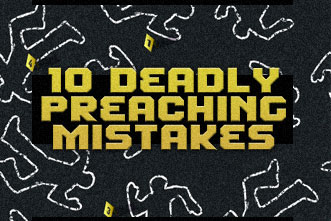In the absence of a union of Pew-Sitting Sermon-Hearing Church Goers (PSSHCG) to let pastors know how the congregation is receiving their sermons, we are hereby taking it upon ourselves to act on their behalf.
There being no PSSHCG union, sermon listeners usually resort to anonymous letters, hurried conferences in the foyer before and after worship, and murmuring in order to express their opinion of the preaching in their church. Such protests are frowned upon by pastors (with good reason), but with no acceptable way of registering their concern, sermon-listeners often have no other recourse but the anonymous letter, the quick foyer conference or murmuring.
Until such a time as this group forms their PSSHCG union, we will (ahem) be glad to speak for them.
As the Apostle Paul once said, “I speak as a fool” (II Corinthians 11:21).
For what it’s worth, what follows are the Ten Commandments of Preaching as felt by the men and women in the pews.
1. Don’t Bore Us.
The cardinal sin of sermons is they can be boring. When you stop to consider the subject with which we deal—God! Jesus! Salvation! Heaven and Hell!—you would agree it takes considerable skill to speak on these in a boring manner. But some are able to pull it off and do so regularly.
What makes a sermon boring? There is no answer to this question. Or to be exact, there are ten thousand answers. The simplest answer is: It depends.
A great sermon for adults would be boring for a group of 8-year-olds. A message for the spiritually mature might be dull for a class of new believers with no spiritual background. For some, a sermon with all precepts and no illustrations would not work. For others, the opposite is true.
Pastors must know their people in order to find their spiritual and intellectual level, what they can understand and will appreciate, what will bypass them or should be saved for another time.
A sermon should interest its audience. (If the pastor finds it boring in his study, I guarantee you the congregation will come to a similar conclusion on Sunday. Better to seek the Lord and either liven it up or find another subject.)
2. Don’t Ignore Us.
This follows on the heel of the first command—don’t bore us. Pastors should know their people. The Ephesians and Romans were a different sort, apparently, from the Corinthians, prompting the Apostle Paul to write to these churches in entirely different ways and on different levels.
Pastors cannot afford to barricade themselves in the study all week and emerge on Sundays to deliver sermons that will connect and bless, inspire and teach. The concept of a “teaching pastor” is one we hear a great deal, about which I sometimes wonder. Every pastor should teach from the pulpit, but only by shepherding the flock during the week will he be able to deliver lessons they find relevant and applications they find workable.
George W. Truett used to say he spent the week diagnosing (i.e., ministering to his church members) so he could prescribe on Sunday.
A sermon should be right for its audience.
3. Don’t Insult Us.
Reruns of old messages may insult your members and depress them once they realize you are not getting with the Lord in your study to find His message but are dipping into your sermon barrel. Once in a while, yes. But not too regularly, preacher.
Old sermons almost always have dated, stale illustrations and often deal with antiquated issues no one cares about any longer.
Recently, I ran across a printed message from a half century ago in which a pastor friend had preached on “why dancing is sinful.” In a world where ungodliness runs along the more serious lines of adultery, alcoholism, pornography, unbelief and greed, such a sermon would not work today. (I am not saying all dancing is acceptable, but that sermons attacking all dancing are insulting to your people.)
A friend who pastors in a dry county in North Carolina told me of a neighboring preacher who led his people to picket a new restaurant that opened in his town. The owners had christened it the “Sagebrush Restaurant and Saloon,” and he found that offensive. No matter that they did not serve alcohol in any way. Day after day, he and his people circled the restaurant holding their signs.
I suggested to my friend that he take up a collection and send that preacher to New Orleans. I would be happy to reintroduce him to the concept of sin, something he has apparently forgotten.
A sermon should respect its audience.












